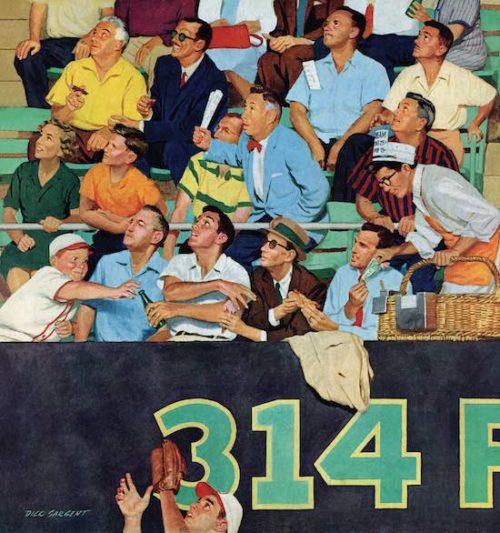Baseball: Opening Day
This article and other features about baseball can be found in the Post’s Special Collector’s Edition, Baseball: The Glory Years. This edition can be ordered here.

April 11, 1959
Richard Sargent
The stars generally find hidden resources on the third Tuesday in April, the day the sun always shines for the addicts. The excitement the fans have been building up for six months always spills over on the field and denudes the players of their studied nonchalance. Through the season the heroes cultivate a dead-pan attitude toward uproars in the stands, but their masks are left in the clubhouse on opening day.
“It’s just another ball game,” they say casually — the oldest, and truest, cliché in the trade. The first game is no more or no less important than the 153 that follow. Rookies bravely mouth the slogan and veterans may even believe it. But bushers and old pros alike are pushovers for the brass bands, the march to the flagpole, and the contagious enthusiasm of the fans. The emotional charge of opening day has inspired many of the most brilliant exploits on record. Year after year, it produces more hustling than the customers are likely to see the rest of the season — anyway until the World Series.
“You always get a special kick on opening day, no matter how many you go through,” Joe DiMaggio says. “There’s a lot of beefing during the season about sleeper jumps on trains, lousy hotel food, and living out of a suitcase half the year, but you forget the gripes on opening day. You look forward to it like a birthday party when you were a kid. You think something wonderful is going to happen.”
For all the natural drama that occurs at the season’s start, Clark Griffith probably deserves major credit for making opening day a national event. Griffith, owner of the Washington Senators, gave baseball a priceless public-relations boost when he conceived of the bright idea of having the president throw out the first ball.
The tradition which was instituted by William H. Taft in 1910 and has been observed every year since — pinch-hitters have acted for the president during wars and other crises — is by all odds the game’s best press-agent pitch.
— “Baseball’s Biggest Day” by Stanley Frank, April 12, 1952